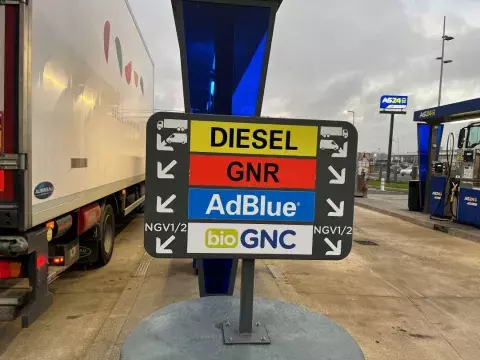
AS 24: THE EUROPEAN DIESEL DISTRIBUTION NETWORK FOR PROFESSIONALS
AS 24, a major player in the distribution of diesel fuel for HGVs, offers road transport professionals a range of quality diesel fuels tailored to their needs – Diesel, Red Diesel, Low-temperature diesel (seasonal availability).
AS 24 facilitates refuelling with Diesel and Red Diesel.
Our infrastructure is suitable for HGVs:

Wide lanes for easier manoeuvring.

High-flow nozzle for Diesel
(10 m3/hour).

Twin tank filling for faster refuelling.

Diesel and Red Diesel available from the same pump to optimise time spent at the station.
Quality control of diesel fuel is a key consideration for AS 24, to ensure that customers receive quality diesel fuel every time they fill up.
Quality control is carried out by our selected suppliers in refineries and depots according to rigorous procedures. AS 24 then carries out analyses at its stations.
Diesel is first and foremost a source of energy used in internal combustion engines. It is also a technical fluid essential for the vehicle to work properly. It meets precise specifications:
Image
Combustion properties. | Image
Lubricating power. |
Image
Sulphur content (environmental impact). | Image
Oxidation behaviour (stability over time). |
It is a product regulated by European legislation:
Lastly, diesel is a formulated product with many components:
Image

Over 93% of fossil hydrocarbons | Image

Up to 7% biodiesel | Image

0.1% additives |
varies according to national regulations and distributors | ||
DIESEL FUEL CHARACTERISTICS
Image
Cetane number of at least 51: Impacts the quality of combustion (start-up, noise, pollutants). | Image
Cold resistance (Winter quality): Impacts engine start-up in winter. |
Image
Low sulphur content: Secures the operation of the catalytic converter, the particle filter and the reduction of pollutants. | Image
Lubricating power: Impacts the durability of various engine components (injection system, etc.) |
Image
Oxidation behaviour and storage stability over time: Impacts the quality of combustion, fouling of storage tanks and engines. |
RED DIESEL OR OFF-ROAD DIESEL (ORD)

In France, since November 2011, all non-road mobile machinery and refrigeration units fitted to HGVs have been required by law to use diesel with a sulphur content of less than 10 mg/kg. As a result, these machines have to be fuelled with ORD, a red-coloured diesel fuel that is taxed at a lower rate.
Other European countries, such as Belgium, the UK, Ireland and Spain, also use rebated diesel for refrigeration units. The AS 24 network distributes this type of diesel in all these countries.
DIESEL IN COLD WEATHER: GOOD ADVICE FOR PROFESSIONAL VEHICLES
The cloud point for diesel is -5°C between October and March and +5°C between April and September. This is the temperature at which the first crystals form in the diesel fuel.
The cold filter plugging point for diesel is -15°C between October and March and 0°C between April and September. This is the temperature at which the first crystals clog the diesel filter.